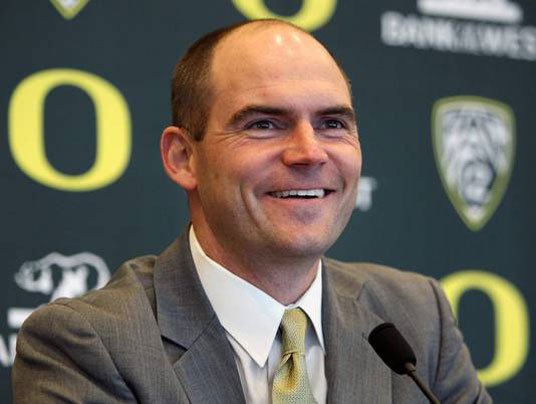 Next man up. That mantra doesn’t apply only to the roster, it applies to Oregon’s coaching staff as well. 1977 was the last time the Ducks didn’t hire their previous offensive coordinator to fill their head coaching vacancy. On Sunday, Mark Helfrich became the latest one to follow that path, and in doing so allowed a staff that had previously gone four seasons without turnover to remain as intact as possible.
Next man up. That mantra doesn’t apply only to the roster, it applies to Oregon’s coaching staff as well. 1977 was the last time the Ducks didn’t hire their previous offensive coordinator to fill their head coaching vacancy. On Sunday, Mark Helfrich became the latest one to follow that path, and in doing so allowed a staff that had previously gone four seasons without turnover to remain as intact as possible.
Now that Helfrich has ascended to the top spot, what are the expectations? History alone says they’ll be high, as each of Oregon’s last three head coaches won the same number of games in their first season as their predecessor did in their last. (H/t to Oregon Asst. Dir. Media Services, Andy McNamara, for pointing that out.)
While Oregon fans are still dreaming of a national championship, 12 wins, regardless of how obtained, would be an amazing feat for a first year coach. Is it realistic? Let’s look at some of the recent coaches who left for the NFL, and how their replacements fared:
Greg Schiano
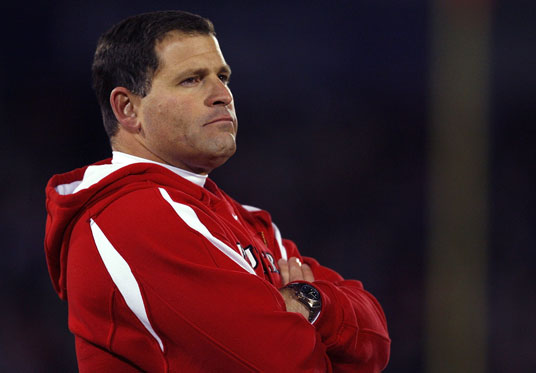 School: Rutgers
School: Rutgers
Replaced by: Kyle Flood, assistant head coach, Rutgers
Outcome: Despite the unfortunate timing of Schiano’s departure just five days before National Signing Day (you may recall Schiano was hired by Tampa Bay after Chip Kelly passed on the job, deep into recruiting season), Flood managed to keep together a recruiting class ranked 24th in the nation by Rivals, which featured one five-star and four four-star recruits. Rutgers had the same record in 2012 as 2011 (9-4), managed to win a share of the Big East title, and Flood was named co-Big East Coach of the Year (along with Louisville’s Charlie Strong). It’s too early to determine the long term effects of what hiring Flood means for the program, but he’s done well in the short-term.
Jim Harbaugh
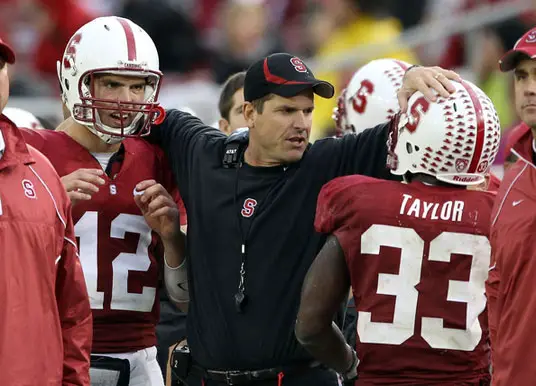 School: Stanford
School: Stanford
Replaced by: David Shaw, offensive coordinator, Stanford
Outcome: Losing arguably the greatest coach in school history (quite a statement, given that they were once coached by Bill Walsh) following the 2010 season should have resulted in more of a setback. Instead, David Shaw led the Cardinal to a second consecutive 11-1 regular season and second straight BCS bowl in 2011, winning Pac-12 Coach of the Year. He followed that up by winning the Pac-12 and the Rose Bowl in 2012, for which he won the conference’s Coach of the Year award again; an impressive achievement given that it took Shaw nine games to figure out who his best quarterback was, and his squad didn’t defeat a single Pac-12 team at home by more than seven points.
Pete Carroll
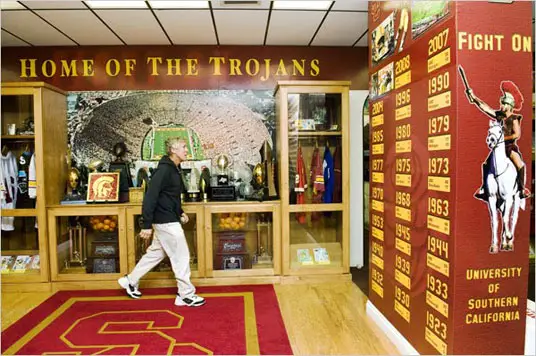 School: USC
School: USC
Replaced by: Lane Kiffin, head coach, Tennessee
Outcome: I don’t think I need to spend too many words on Lane Kiffin, especially since I already did; although mentioning he’s the first-ever coach of a preseason #1 team to lose six games in a season should be sufficient. We don’t know how many of USC’s disappointments can be blamed on Kiffin, given their sanctions, but if he had produced these results at full strength, he wouldn’t still be the coach of the Trojans.
Bobby Petrino
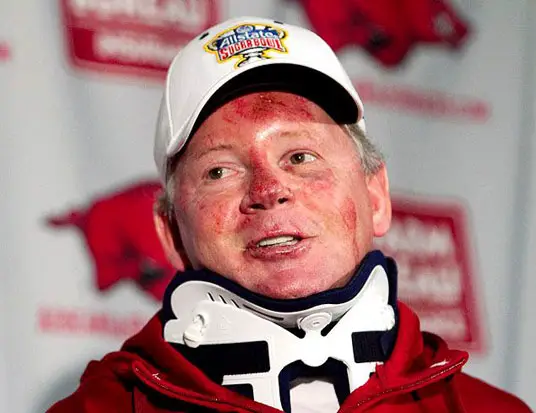 School: Louisville
School: Louisville
Replaced by: Steve Kragthorpe, head coach, Tulsa
Outcome: The Cardinals went from Big East champs to 6-6 and left out of a bowl game in Kragthorpe’s first year. It ended up being the best year of his tenure, as Louisville went 5-7 and 4-8 the following seasons before being replaced by Charlie Strong in late 2009. Strong returned Lousville to Big East champs in 2012, for which he was rewarded with an eight-year contract paying him $3.7 million per year, or more than every coach in the ACC.
Nick Saban
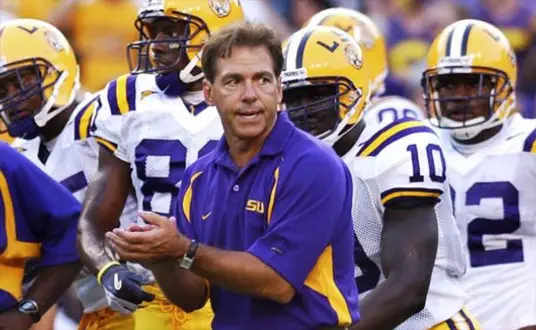 School: LSU
School: LSU
Replaced by: Les Miles, head coach, Oklahoma State
Outcome: Using mostly Saban’s players, Les Miles was able to win 11+ games his first three seasons in Baton Rouge, something Saban only did once (2003), including winning the national championship in 2007. Miles eventually established that he could succeed with his own recruits, leading to the Tigers to the 2011 BCS Championship and one of the best regular seasons by a team in recent memory. He may have failed to win a title that season, but it’s hard to dispute the value of any replacement who has led a program to two title games with two different sets of players during his tenure.
Steve Spurrier
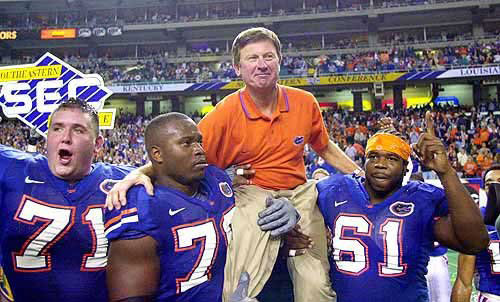 School: Florida
School: Florida
Replaced by: Ron Zook, defensive coordinator, New Orleans Saints
Outcome: Bookended by championship-winning coaches – he replaced Spurrier and was succeeded by Urban Meyer – he failed to win more than eight games in any of his three seasons in Gainesville. What Zook never gets enough credit for are his contributions to Florida as a recruiter; his recruits occupied many spots on the rosters on both of Urban Meyer’s championship teams. Unfortunately, he never recruited Tim Tebow (he had already moved on to Illinois by Tebow’s junior year of high school), so he remains largely dismissed in his relevancy to the program.
Butch Davis
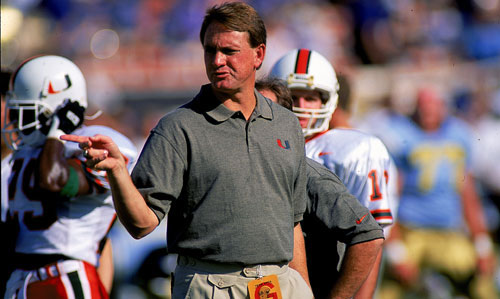 School: Miami
School: Miami
Replaced by: Larry Coker, offensive coordinator, Miami
Outcome: Coker’s hire is always pointed to as an example of a transition gone wrong – the Hurricanes were a 7-6 team within five years – but many fan bases would take being a seven-win team if it yielded what he produced before that: a national championship (something Davis never won), two National Championship Game appearances, three conference championships, and three BCS bowl victories. Things may have tailed off at the end of the Larry Coker era, but he also shepherded an immense amount of talent to one title, and came within a question pass interference call of winning another.
Mike Riley/Dennis Erickson
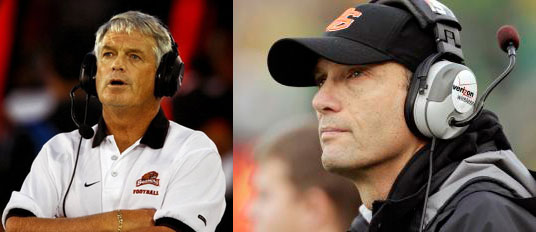 School: Oregon State
School: Oregon State
Replaced by: Dennis Erickson/Mike Riley, head coach, Seattle Seahawks/San Diego Chargers
(though Riley had been the Saints’ assistant head coach in 2002)
Outcome: Both Erickson and Riley represented exactly what the program needed at the time of their hirings. Erickson took the campfire Riley was meticulously building and poured gasoline on it; burning it bright (winning the Fiesta Bowl following the 2000 season with a lot of JUCO talent) and fast (going 5-6 the next season). Once he left, Riley became the perfect coach for a program that had lost two head coaches to the NFL in four seasons – someone who wanted to stay. Riley is currently under contract through 2019, with an automatic one-year extension each time the Beavers play in a bowl game.
What does this mean for Oregon?
For teams that went outside the program to find their replacement, the following season was a crapshoot. Some teams on this list (Florida, Louisville) missed on their immediate replacements, but the next hire returned the program to previous success.
Like Larry Coker (who had more success his first two seasons, by the way), David Shaw was a promoted offensive coordinator who took his teams to heights his predecessor could not. While there’s no reason to believe Shaw won’t be a success, it’s interesting to see the amount of public vacillation that Stanford made a home run hire. As the only two promoted offensive coordinators on this list, it will also be interesting to compare the paths of Shaw and Helfrich, and whether they can establish their own success long-term.
While the long-term success of a promoted coordinator is uncertain, every team on this list that promoted directly from within (as Oregon did) not only did as well or improved the following season, but each one of them won at least a share of the conference title. While Oregon’s success may be a question mark until we get a better understanding of Helfrich as a head coach, history indicates 2013 appears to be very bright for the Ducks.
Related Articles:
Nathan Roholt is a senior writer and managing editor emeritus for FishDuck. Follow him on Twitter @nathanroholt. Send questions/feedback/hatemail to nroholtfd@gmail.com.
